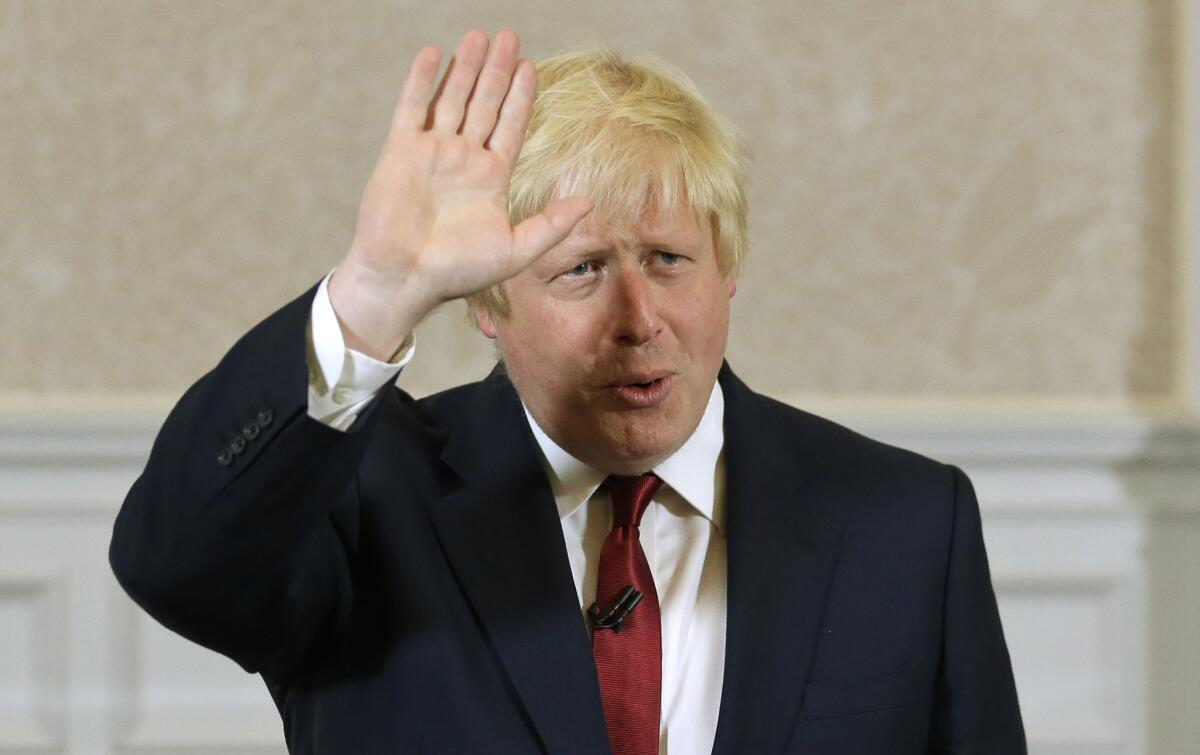Who’ll wait tables and build houses? Britain’s new immigration plan triggers outcry

- Share via
LONDON — The British government’s new plan to exclude “low-skilled” immigrant workers such as baristas, construction laborers and caregivers ignited a nationwide outcry Wednesday from business groups and employers who warned that the restrictions could cripple a broad swath of industries.
The stringent post-Brexit immigration policy, unveiled by the government of Prime Minister Boris Johnson late Tuesday, would make it far more difficult for nationals of European Union countries to live and work in Britain beginning next year, when last month’s formal departure from the EU takes effect.
The proposed new rules, the most sweeping immigration overhaul in years, are a precursor to sweeping social and economic changes to be ushered in as Brexit takes hold. Critics have predicted many of those will be to Britain’s long-term detriment.
The measures, however, would ease entry barriers for non-EU nationals. That reversal comes as Britain abandons a cornerstone of its membership in the bloc, free movement among what had been its 28 nations.
Anti-immigrant sentiment was a major driver behind Britain’s 2016 vote to quit the EU — an echo of the populism and xenophobia that have swept other European countries over the last several years. Johnson’s harsh approach also mirrors that of President Trump, who favors an immigration system that would essentially exclude the poor and unskilled.
The new rules demand that immigrant workers speak English; many currently do not. Most of those from elsewhere in the EU who have come to Britain over the last 15 years would not qualify for a work visa under the new standards, which require English-language skills and a well-paying job offer from an approved employer.
“No more bright young people, arriving in London with dreams of making it and seeing what they can do,” Ian Dunt wrote on the website Politics.co.uk., describing the new policy. “No more musicians getting their big break... No more care workers looking after aging Brits. No more construction workers from Poland, out in all weather, getting the job done.”
In announcing the changes late Tuesday, Johnson’s government said the new rules would “open the U.K. to the brightest and the best from around the world” while ending reliance on “cheap, low-skilled labor coming into the country.”
Critics said the policy fails to take into account that hundreds of thousands of workers, including those who unblock sinks, care for the elderly and pick vegetables, might not meet language and salary requirements.
The government may allow certain exceptions to stem labor shortages in some fields. But the policy makes clear that Johnson’s government is determined to make fundamental changes in the composition of the country’s low-skilled immigrant workforce.
Coming just weeks after Britain formally left the EU in name, if not yet in practice, the move is meant to encourage people with the “right talent” to come to the country, said Home Secretary Priti Patel. She said the new system was meant to encourage employers to retain staff, employ more British nationals and move toward automation where possible.
However, leaders from industries such as construction, hospitality and farming said they are already struggling to recruit staff and are highly dependent on less-skilled workers, many of them from EU countries. Healthcare executives expressed particular alarm.
“Cutting off the supply of prospective care workers under a new migration system will pave the way for more people waiting unnecessarily in hospital or going without care,” the U.K. Homecare Assn. said in a statement.
Carolyn Fairbairn, director general of the Confederation of British Industry, called the new rules a “very serious concern,” saying employers needed time to adapt to the end of free movement from elsewhere in the EU.
Johnson’s government hopes to put this new points-based system in place in 10 months, as part of an overall new agreement governing trade and other matters with the EU. Many critics believe that timetable is unrealistic.
Patel, the home secretary, drew particular criticism over her assertion that the labor shortfall could be made up for with the help of some of the 8 million Britons currently deemed “economically inactive.” Experts said that figure includes people unlikely to look for jobs — students, the recently retired, the long-term sick and those providing care to family members.
Under the new rules, sectors such as construction would be particularly hard hit. The building industry is heavily reliant on immigrant labor, with 14% of the workforce coming from outside the U.K. That figure rises to 54% in London, according to the Federation of Master Builders, which represents thousands of small- to medium-sized construction firms.
The federation’s chief executive, Brian Berry, said the industry was already facing a labor shortfall, and the new policy would exacerbate that.
“Who is going to build the 1 million new homes that the government has said it wants to build over the lifetime of the Parliament?” he said. “When we have got a skills crisis happening already in the industry and we are going to reduce the supply, we’ve got a problem.”
Beginning Jan. 1, 2021, the new immigration rules — which would vet prospective arriving workers according to skills, qualifications, English-speaking ability, salary and profession — will apply to EU and non-EU citizens alike, though not to the more than 3 million EU citizens already living or working in the U.K.
Under the new rules, those wanting to work in Britain will need an offer from a known employer for a salary of at least 25,600 pounds, which is $33,000 a year, with some exceptions in certain fields.
“We will not introduce a general low-skilled or temporary work route,” the policy proposal said. “We need to shift the focus of our economy away from a reliance on cheap labor from Europe and instead concentrate on investment in technology and automation.”
“Employers will need to adjust,” it added.
Under the plan, immigration would be slashed from its current level of more than 200,000 people a year, although the government has not set a new target. Parliament must still approve the proposal, but Johnson’s Conservatives hold a strong majority, thanks to the party’s resounding victory in December elections.
Special correspondent Boyle reported from London and Times staff writer King from Washington.
More to Read
Sign up for Essential California
The most important California stories and recommendations in your inbox every morning.
You may occasionally receive promotional content from the Los Angeles Times.










